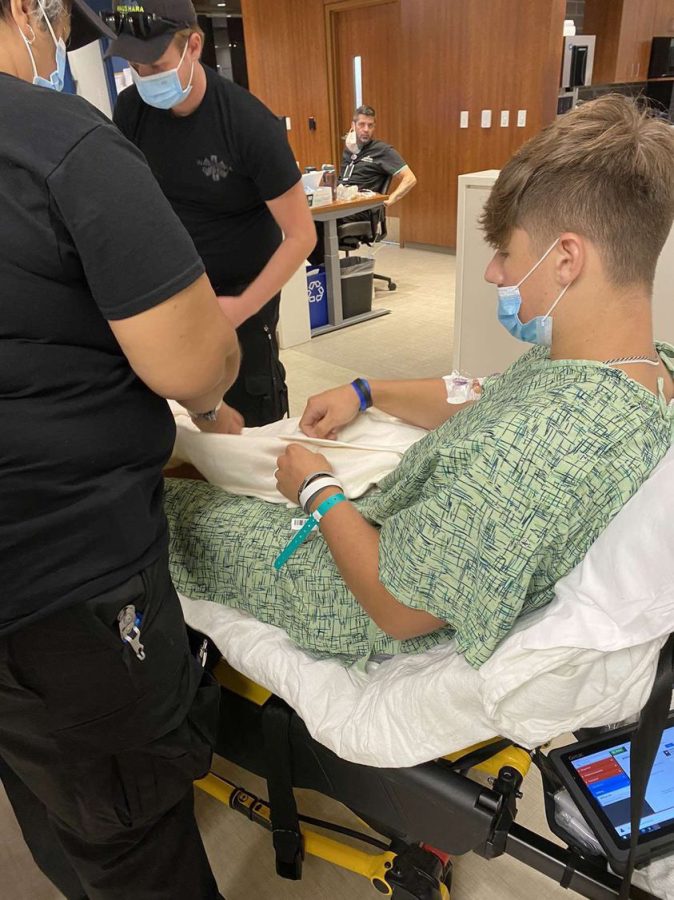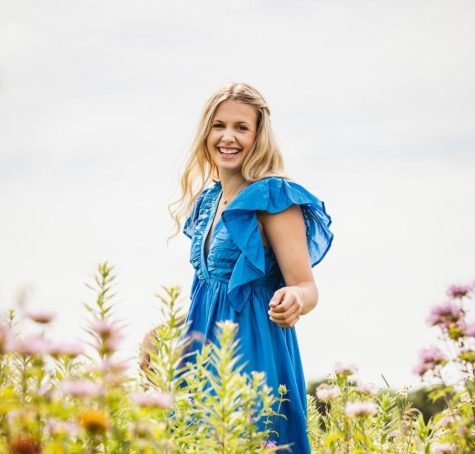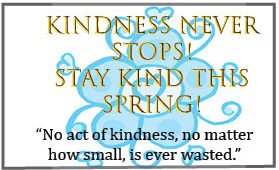Class of ’22 graduate faces life-threatening disease
November 30, 2022
Recent graduate, Hunter Boegh ‘22, was diagnosed with aplastic anemia on Sept. 16. Aplastic anemia occurs when a person’s body stops producing enough new blood cells. It has to be treated with chemotherapy and a bone marrow transplant. Like anyone, Hunter said that he initially did not think much of his symptoms.
“I first realized that something was wrong when I was starting to bruise very easily and had long-lasting headaches. I was playing football when I first started to notice these symptoms. I play quarterback, and during practice, I wouldn’t even get tackled for the sole purpose of keeping us healthy. When I saw baseball size bruises all over my legs I knew something wasn’t quite right,” Boegh said. “The next thing, like I said, was headaches. After running for certain amounts of times I was very nauseous. I thought it might have been because I was out of shape so I pushed off checks with the clinic at my school.”
Labor Day weekend was the first time that Boegh went into the doctor’s office to get checked out.
“He had his first official football game that Sunday of Labor Day weekend, but was not able to play for the rest of the season. That was heartbreaking. I took Hunter to the Berlin Walk-In to have him checked out,” Hunter’s mom, Kris Boegh said.
The clinic then gave the Boegh family a call back and told them that Hunter’s blood counts were critically low.
“My white blood cells were two instead of four, my red blood cells or hemoglobin was at six instead of 14, and my platelet count was three instead of 150,” Hunter said.
Hunter was then rushed to Froedtert Hospital in Milwaukee to receive emergency care.
“He needed a blood transfusion as well as a platelet transfusion. They thought he had leukemia, but that test came back negative. They ran every test from cancers, autoimmune diseases, bacterial and viral diseases and they all came back negative,” Kris said.
Hunter ended up spending six days in the hospital. On Hunter’s second to last day in the hospital, the doctors ended up doing a bone marrow biopsy to truly figure out what was going on with Hunter.
“The bone marrow is the primary source where these products (blood products) are made. Essentially, the bone marrow biopsy would tell them what was really going on. The biopsy consisted of them drilling into my bone marrow to get a sample of it, and yes, I was awake. Unfortunately, they messed up the first time and had to repeat the biopsy again the next day,” Hunter said.
When the bone marrow biopsy was done and the results were back, Hunter found out that he had aplastic anemia.
“Hunter came in contact with some kind of viral infection that caused his immune system to attack his bone marrow,” Kris said.
Even though aplastic anemia is a rare condition, Hunter is in some of the best care medicine has to offer.
“Froedtert and Children’s Hospital receives patients like Hunter from all over the country. They are known for treating aplastic anemia, so Hunter is in the best place possible. They get six to 10 people a year where their bone marrow doesn’t produce red and white blood cells and they don’t know what caused this to happen. This is a rare condition,” Kris said.
Fortunately for Hunter, aplastic anemia does have a cure. Bone marrow has to be transplanted from a donor and into the body of the person with the disease. First, a person must match with a donor whose bone marrow is compatible with theirs.
Bone marrow transplants are not an easy thing to go through. In order to prevent one’s immune system from attacking the new bone marrow, a patient must first undergo chemotherapy to weaken it. For Hunter, this chemotherapy and bone marrow transplant had to be postponed a week due to a sinus infection.
“I will be receiving chemo for six days and on the seventh day, I will get transfused with the new donor cells. I will then have to stay in the hospital for six weeks to make sure I don’t develop graft-versus-host disease. After the six weeks when my numbers are starting to improve I will be able to return home and continue my recovery. I will have to isolate myself from large groups of people for some time. Most likely I will be able to come back to regular day life in late February,” Hunter said.
This entire journey will continue to be an upward battle for Hunter. However, Hunter is surrounded by many family members and friends that will support him along the way.
“I love how our little community comes together to help a 19-year-old boy try to get through the toughest moments of his life. He needs love and support, because there are days when he is very sad, and nice gestures from others will help him get through it,” Kris said.
Even though aplastic anemia is an extremely rare and possibly life-threatening disease if not treated properly, Hunter has been able to find gratitude throughout his experience.
“One thing I would just like to say about the whole experience is that it’s extremely humbling. Never in a million years would I think I would be physically sick and incapable of playing the sport I love at the start of my college career. More about the humbling part is that being in Children’s hospital, I see how much worse I could have it. Little kids that have cancer or other life-threatening diagnoses break my heart. The one thing that everyone should know is yes, this experience and aplastic anemia sucks, but it’s not cancer. For that I am grateful,” Hunter said.
If you would like to donate to the Boegh Family, click here.
If you are interested in becoming a donor, click here.












